-
Academics
- Academics Overview
-
Undergraduate
- Undergraduate Overview
- Agricultural Education
- Early Childhood Education, B.A.
- Elementary Education, B.A.
- Middle Level Education, B.S.
- Mathematics Teaching, B.S.
- Modern Languages Education, B.A.
- Special Education, B.A.
- Secondary Education, B.A.
- Science Teaching, B.S./B.A.
- Athletic Leadership Minor
- Human Capital Education and Development
-
Master's and Specialist Programs
- Master's and Specialist Programs Overview
- Athletic Leadership (Online)
- Counselor Education
- Educational Leadership
- Human Resource Development
- Learning Sciences
- Literacy (Online)
- Middle Level Education, MAT
- Modern Languages, MAT
- Secondary Education, MAT
- Special Education (Online)
- Student Affairs
- Teaching and Learning (Online)
- Teaching and Learning, Ed.S.
- Doctoral Programs
- Certificates | Endorsements | Licensure
- Expressway to Tiger Town
- Bachelor's To Master's | Teacher Residency
- Teaching Fellows
- Research
- Programs
- Students
- About
Contexts of Learning & Development Lab
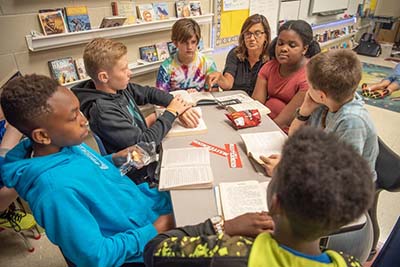
The Contexts of Learning and Development Lab at the College of Education brings together faculty and students to address issues relating to healthy human development and learning across complex ecological contexts – classrooms, schools, families, and communities. Our members lead research, teaching, and service projects in collaboration with multiple stakeholders in the state of South Carolina and around the world.
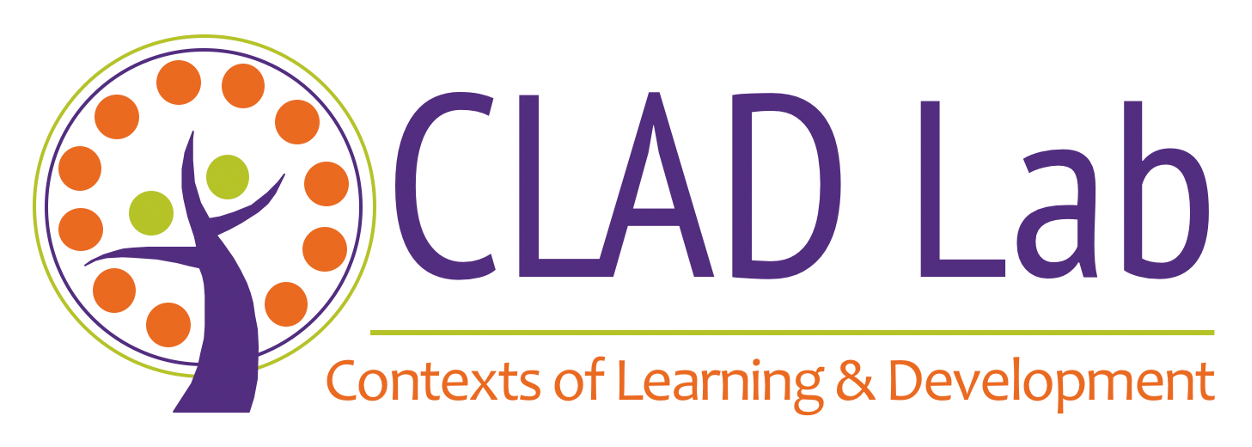
-
About CLAD
Mission
The mission of the Contexts of Learning and Development (CLAD) Lab is to leverage interdisciplinary approaches and an ecological systems perspective to advance the healthy development and learning of students and teachers in South Carolina and around the world.
Research
- Conducting rigorous, multi-method research to produce evidence-based theories of learning and teaching across developmental contexts.
- Creating innovative professional development approaches to support educators.
- Developing assessment tools for evaluating numerous aspects of the learning experience.
Teaching
Providing a variety of high-quality mentorship opportunities for learning sciences doctoral students so they may positively influence the state of education and human development in their future careers.
Service
Supporting educators and community partners through a variety of evidence-based professional development experiences.
Our goal is to positively influence learning research, policy, and practice, through our work.
-
People
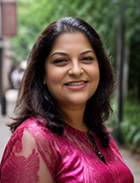 Faiza Jamil
Faiza JamilFaiza M. Jamil (Ph.D., Educational Psychology-Applied Developmental Science, University of Virginia) is an associate professor in Education and Human Development and the founder of the Context of Learning and Development Lab. Her research follows two complementary strands: 1) understanding the underlying psychological processes – cognitive, social, and emotional – that influence teachers’ classroom behaviors and career decisions, and 2) understanding the ways in which teacher-child interactions influence children’s learning and development. More specifically, Dr. Jamil conducts research that leverages her expertise in rigorous quantitative methodologies and professional development to better understand and improve the educational experiences of teachers and students within these two broad strands, with a particular focus on issues of educational equity. Dr. Jamil teaches courses related to human development in the Clemson’s Learning Sciences Doctoral Program and Teacher Education Programs, to which she brings her own experiences as a K-12 teacher in three countries. Her book, Public Education in Turbulent Times: Innovative Strategies for Leadership and Learning, was published by Palgrave Macmillan.
 DeOnte Brown
DeOnte BrownDeOnte Brown (Ph.D., Learning Sciences, Clemson University) is an assistant dean of undergraduate studies at Florida State University. Dr. Brown's research focuses on equity in education with specific interests related to anti-Blackness in education, culturally affirming educational practices and the experiences of underrepresented students in attainment of educational outcomes. Primarily he emphasizes a focus on personal, behavioral, and environmental factors at the collegiate level. DeOnte’s dissertation research focused on understanding the relation among affirmation of Blackness in the educational environment and life and career perspectives of Black college students. Additionally, he leads a center focused on the success of underrepresented students (i.e., first-generation, students of color, students with limited resources, etc.) and college access for middle/high school students with similar underrepresented identities as the college students.
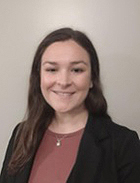 Abby Stephan
Abby StephanAbigail (Abby) Stephan (Ph.D., Learning Sciences, Clemson University) is a Research Assistant Professor in the Department of Psychology and an affiliated faculty member in the Institute for Engaged Aging at Clemson University. Her research a) explores the influence of intergenerational relationships in family, community, and educational contexts on learning, development, and well-being across the lifespan and b) examines social and psychological factors that promote healthy aging. In addition to taking an ecological, systems-oriented perspective, her work often employs a mixed methods design and is interdisciplinary, drawing from gerontology and aging studies, family and community science, developmental psychology, education, youth development, anthropology, and sociology. She earned her Certified Family Life Educator (CFLE) credential to further the translation of her research to applied settings. Beyond research, she is committed to advancing the development, implementation, and evaluation of evidence-based educational opportunities that support learners across the lifespan. She is a member of the Study of Healthy Aging and Applied Research Programs (SHAARP) Lab and the Contexts of Learning and Development (CLAD) Lab.
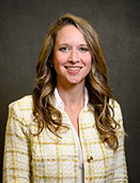 Amanda Bennett
Amanda BennettAmanda Bennett (Ph.D., Learning Sciences, Clemson University) is a lecturer in Education and Human Development within the College of Education. Dr. Bennett serves as a faculty member in Clemson’s undergraduate and masters level teacher education programs and teaches courses related to child development, educational psychology, classroom-based research, effective online teaching, and STEAM assessment strategies, to which she brings her own experience as a K-12 teacher. Her research interests focuses on early childhood learning and development and STEAM (science, technology, engineering, arts/humanities, mathematics) instruction, specifically the integration and development of children’s social-emotional skills, and teacher professional development.
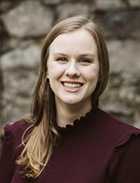 Georgia McKown
Georgia McKownGeorgia McKown, Ph.D., currently works as a Regional Behavior Coach with the Behavior Alliance of South Carolina where she supports the needs of school districts in the Upstate and across South Carolina. She holds a Ph.D. in Learning Sciences from Clemson University where her research focused on supporting the needs of military-connected students, leveraging educational technologies, and teacher education.
Georgia also has professional experience supporting the needs of educational nonprofits, previously serving as an Instructional Designer and the Director of Planning, Analysis, and Evaluation with the Military Child Education Coalition. In these roles, she led the identification and planning of new programming and ongoing improvements for educational support initiatives and researched, designed, and developed professional development content for education professionals serving military-connected youth.
Prior to her academic and nonprofit experiences, Dr. McKown also worked as a Second and Third Grade Teacher in Virginia Beach City Public Schools where she designed and facilitated professional development courses on leveraging technology in instruction across the district.
Dr. McKown’s research focuses on leveraging educational technologies and teacher education to meet the needs of diverse student populations, with a specific focus on supporting military-connected students. With a strong passion for enhancing educational experiences, Dr. McKown is dedicated to driving positive change in the field of Learning Sciences through innovative research, strategic planning, and effective instructional design.
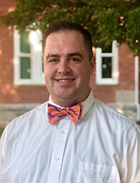 Robert O'Hara
Robert O'HaraDr. O’Hara holds a PhD in Learning Sciences from Clemson University. His research focuses on the classroom environments influence on undergraduate students’ motivation, sense of belonging, and academic confidence. Using Relational Developmental Systems theories, he explores the reciprocal interactions between students and classroom environments to promote learning and development. Prior to his position as a Lecturer in Psychology, Robert served the Department of Education & Human Development in the College of Education as a graduate assistant in the Quantitative Clinic and teaching assistant for doctoral-level statistics courses. Additionally, Robert has experience as a graduate researcher in both Automotive and Civil Engineering assisting faculty with educational research on grant-funded projects. For this work, as well as his own research, Robert was awarded the College of Education’s Graduate Student Excellence in Research Award in 2021 and 2023. As a graduate student, he held several leadership positions across campus including two terms as President of Clemson’s Graduate Student Government. Before coming to Clemson in 2018, Dr. O’Hara worked as a student-affairs professional in housing and residence life at two institutions. Dr. O’Hara is looking forward to continuing his time at Clemson as a faculty member and is excited to be teaching statistics and research methods to undergraduate students.
Students
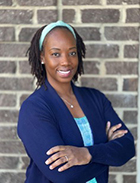 Shanada McFadden
Shanada McFaddenShanada is a doctoral student in the Learning Sciences with an emphasis on understanding how youth in the juvenile justice system develop and navigate influential societal systems (e.g., judicial, educational, community) in their lives. Shanada’s research interests include examining the development of formerly incarcerated juveniles and researching protocols in academia and the judicial system that are designed to help them. Prior to graduate school Shanada worked as a Licensed Masters Social Worker conducting a pilot study with Greenville County DJJ, appointed judges and the Greenville County Detention Facility to develop protocols that incorporated Adverse Childhood Experience Scores once a juvenile is detained. Shanada has publications, presentations and news coverage surrounding the successes of her pilot study “Phoenix Connect”. Shanada wants to further develop her research interests within the juvenile population. Additionally, she volunteers with other youth organizations that support her research agenda.
 Nora Lee Hochstetter
Nora Lee HochstetterNora is a doctoral student in the Learning Sciences program. Her research interests broadly include motivation, engagement, and self-efficacy for emergent bilingual and multilingual learners. Nora’s research is practitioner-focused, aiming to inform effective practices to foster inclusivity and community-building in the multicultural classroom with an emphasis on classroom discourse and interactions, teacher feedback, and family engagement. Nora has a Master's degree in English from the University of Wisconsin-Madison with a concentration in Applied English Linguistics and is a certified Teacher of English as a Second or Other Language (TESOL). Prior to her doctoral work, Nora previously taught adult emergent English bilingual students in both non-profit and higher education institutions. Currently, she works as a graduate research assistant within the Department of Education and Human Development on a study examining teacher workforce diversity.
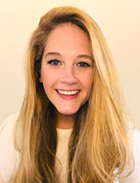 Virginia Clark
Virginia ClarkVirginia is a 3rd year doctoral student in the Learning Sciences program. Her research interests focus on the intersection between the fields of education, biology, neuroscience, and psychology. Virginia is an interdisciplinary researcher, viewing learning and education through the lens of neurobiology, through the use of large-scale educational data, data analysis and visualizations, and the integration of cutting-edge neuroimaging techniques into educational research, focusing on learning in informal contexts, secondary education, during adulthood, and within the workplace. Virginia currently works as a graduate assistant for a Department of Education grant under the Senior Associate Dean for Research and Graduate Studies for the College of Education. She holds a Bachelor’s degree from Emory University in Neuroscience and Behavioral Biology, and a Master’s degree in Biology with a concentration in Neurobiology from Georgia State University. Her previous graduate research was in the genetic control of neuroplasticity in the developing retinocollicular sensory pathway following traumatic brain injury. Prior to beginning her doctoral work, Virginia was the Director of Research and Methodology at a non-profit K-12 school for children with neurological challenges and as an Adjunct Instructor at Georgia State University teaching Human Anatomy and Physiology lecture and laboratory courses.
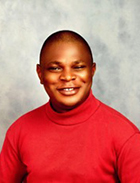 Itunu Olaniran Akande
Itunu Olaniran AkandeItunu is a lecturer and research fellow in the Department of Educational Technology and Library Studies, Obafemi Awolowo University, Ile-Ife. He teaches Digital Media and Learning, Diffusion and Adoption of Innovation, Developments in Educational Technology and Fundamentals of Instructional Design.
He works as a research fellow in the Emerging Technologies for Education Lab and the Digital Communication and Media Lab in the Department of Educational Technology and Library Studies, Obafemi Awolowo University.
His research interests broadly surround the philosophical foundations of learning and the ecological frames (cultural, social, psychological, pedagogical…) of technology-supported learning environments and systems.
With varied academic backgrounds in Electronic and Electrical Engineering, Media (Radio, Film and Television Productions) and Education, his research embraces the intersections in STEAM (science, technology, engineering, arts/humanities, and mathematics) and explores educational contexts of learning within these spheres.
Itunu’s collaborations with pre-service and in-service teachers drive his need to investigate teachers’ measures of competence; particularly in technology-aided learning spaces to improve teacher education process, professional development of teachers and ultimately; learning outcomes.
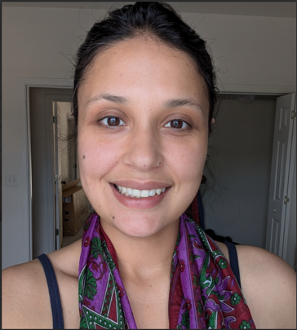 Verdah Rehan
Verdah RehanVerdah specialize in movement-based learning, mindful practices, and non-traditional classroom settings. With over a decade of experience in program development and leadership at VRK Studios, She designed and managed impactful wellness initiatives reaching thousands globally.
Currently, as a PhD student in Learning Sciences & Human Development, and as a Graduate Teaching Assistant at Clemson University, She is preparing to teach Educational Psychology and designing an asynchronous course for Special Education, focused on accessibility. She also contributes to research on parent-teacher relationships in rural contexts, with the aim to bridge educational gaps and establish collaborative partnerships.
Driven by a commitment to innovation in education and wellness, Verdah leverages her expertise in curriculum development, strategic leadership, and community engagement to create inclusive and transformative learning environments.
 Bouchra Boukhiar
Bouchra BoukhiarBouchra Boukhiar is a second-year student in the Learning Sciences program at Clemson University and the only student from Algeria at the institution. She is fluent in English, French, Arabic, and Berber. With a Master’s degree in Language Sciences, she developed a protocol for teaching French as a second language to children with Down syndrome in Algeria. At Clemson, she teaches EDF 3340: Child Growth and Development and EDF 4800: Digital Media & Learning.
Bouchra’s research focuses on teacher training programs through AI simulations, with specific interests in machine learning, motivation, teacher leadership, classroom management, and assessments. She also has extensive experience volunteering for quality education initiatives as part of the Sustainable Development Goals (SDG) and has contributed to organizations that promote learning and equity. She is open to collaboration on projects related to her areas of expertise.
-
Projects
College of Education Podcast
CLAD lab members will be hosting a podcast series starting in October to explore and highlight the perspectives of administration and faculty in the College of Education and across the University regarding the educational impacts and insights associated with the pandemic. In particular, how the pandemic has reshaped missions/objectives, research efforts/lenses, teaching philosophies/practices, and focus on service efforts in higher education. Furthermore, how self-reflection on the "lessons learned" can pave paths for applying these lessons to educational innovation and reform. If you have any questions, feel free to contact Heather Brooker at brooke2@clemson.edu.
Understanding the Links Between PK-16 Early Learning and Developmental Experiences
A secondary data analysis of the Early Childhood Longitudinal Study (birth and kindergarten cohorts) will be used to investigate questions about the impact of early educational and developmental experiences on children’s learning outcomes in subsequent years, with particular focus the development of achievement gaps. One primary goal is to explore how early experiences with caregivers and teachers vary by children’s demographic characteristics, such as gender, ethnicity, socioeconomic status, and geographic context, and to measure the extent to which these experiential differences influence children’s development and academic achievement in subsequent years of schooling through middle school. Contact Faiza Jamil for more information (fjamil@clemson.edu).
Academic Opportunities for Military-Connected Students
This project uses bioecological system theory to organize existing work concerning military-connected children and families in an effort to understand the various assets and constraints that the military lifestyle may have on children’s academic development. Additionally, this project will use latent profile analysis to explore trends in academic development within the military-connected student community to better understand which military lifestyle demands may be protective or disruptive to students’ academic development. Finally, this study will use qualitative interviews with teachers, parents, and students in the military-connected community to more deeply explore the military-connected student experience. Taken together, the parts of this project will help to explore the complex relationships between military-connected students and their communities in order to guide the development and implementation of future interventions. Contact Georgia McKown for details (glmckow@clemson.edu).
Examining Intergenerational Relationships in the Family
This project evaluates learning experiences between adjacent and non-adjacent generations in the family against core components of structured intergenerational learning. It explores the contemporary grandparent’s experience, role, and purpose in the family using a mixed methods approach, and further examines the influence of grandparent relationship type, either recreational or custodial, during childhood and the role of intergenerational narratives on life satisfaction in emerging adulthood. The overall purpose of this collective work is to develop a deeper understanding of intergenerational relationships within the family context, with special consideration of experiences and wellbeing outcomes for non-adjacent generations. Contact Abigail Stephen for more information (atsteph@clemson.edu).
Belonging in Engineering Undergrads
This study seeks to better understand how classroom environments (i.e. structured learning environments) and identity, specifically racial and gender identity, influence or control the complicated relationship between sense of belonging and academic success within undergraduate engineering classrooms. The project draws on the experiences of individuals in classroom environments to demonstrate how environments, both individually and interacting with race and gender, create differences among students within those classrooms in an effort to use the results to influence how classroom environments are structured. Contact Robert O’Hara for more information (rmohara@clemson.edu).
Representation Matters: Compiling the Data to Measure the Effect of Teacher Workforce Diversity Policies on Reducing Ethnoracial Inequalities in Academic Outcomes
The persistent test score gap between students of color and White students is in part due to unequal educational opportunities, such as teacher–student ethnoracial match, or the alignment between teacher and student race or ethnicity. Students of color are far less likely than their White peers to have teachers who share their racial or ethnic background. A growing number of states have introduced policies promoting the recruitment and retention of teachers of color, but the lack of systematically collected teacher demographic data limits understanding of the relative effectiveness of these policies across district contexts. This project addresses this gap by developing a publicly available database on teacher demographics and diversity policies. It also conducts foundational analyses of the relationship between teacher diversity, student academic outcomes, and district contextual characteristics over time. Ultimately, the study will support further research on teacher–student ethnoracial match as a lever to reduce racial and ethnic inequalities in academic outcomes and lay the groundwork for future impact studies of state-level teacher workforce diversity policies. Contact Faiza Jamil for more information (fjamil@clemson.edu).
W.T. Grant Foundation’s Mentoring Grant
Dr. Faiza Jamil and CLAD lab member Nora Hochstetter were awarded the W.T. Grant Foundation's Mentoring Grant in June of 2024, a program designed to assist doctoral students and junior researchers of color with their research initiatives and build a network of support. The Mentoring Grant also provides professional development to faculty to strengthen mentorship practices and promote positive mentor/mentee relationships across their institution.
-
Publications
2023
Stephan, A. T., Hochstetter, N. D., Clark, V. E., & Jamil, F. M. (2023). From supportive to strained: A mixed methods exploration of emerging adults’ characterizations of past and present grandparent-grandchild roles and relationships. Emerging Adulthood, 11(4), 933-946. https://doi.org/10.1177/21676968231171738
Stephan, A. (2023). How grandparents inform our lives: A mixed methods investigation of intergenerational influence on young adults. Journal of Adult Development. Advance Online Publication. https://doi.org/10.1007/s10804-023-09446-7
Stephan, A. (2023). Grandparent caregiver wellbeing: A strengths-based approach utilizing the Positive Emotions, Engagement, Relationships, Meaning, and Accomplishment (PERMA) framework. Journal of Family Issues, 44(5), 1400-1418. https://doi.org/10.1177/0192513X211058818
Herro, D., Frady, K., & O’Hara, R. (2023). Exploring technical college student’s collaborative problem solving and teamwork skills in multi-hierarchical engineering design teams. European Journal of Engineering Education, 48(6), 1291-1311. https://doi.org/10.1080/03043797.2023.2286315
Peer Reviewed Articles
2022
Jamil, F., O’Hara, R., Stephan, A., Bennett, A., Hochstetter, N. (in review). Representation matters: Understanding the role of an ethnically diverse teacher workforce in closing opportunity gaps.
Jamil, F., Stephan, A., & Bennett, A. (in press). Exploring longitudinal changes in teacher expectancy effects on children’s literacy achievement. Elementary School Journal.
Stephan, A. T., Hochstetter, N. D., Clark, V. E., & Jamil, F. M. (2023). From supportive to strained: A mixed methods exploration of emerging adults’ characterizations of past and present grandparent-grandchild roles and relationships. Emerging Adulthood. Advance online publication. https://doi.org/10.1177/21676968231171738
Jamil, F., & Emerson, A., McKown, G., Stephan, A. (2022). The struggle is real: An investigation of preschool teachers’ perceptions of students’ challenging behaviors through reflective writing. Early Childhood Education Journal. 50, 1395–1405. https://doi.org/10.1007/s10643-021-01267-1
Bennett, A., & Jamil, F. (2022). Kindergarten teacher responses to a contextualized professional development workshop on STEAM teaching. International Journal of Teacher Education and Professional Development (IJTEPD), 5(1), 1-15. http://doi.org/10.4018/IJTEPD.304871.
Rapa, L. J., Bolding, C. W., & Jamil, F. M. (2022). (Re) examining the effects of open classroom climate on the critical consciousness of preadolescent and adolescent youth. Applied Developmental Science, 26(3), 471-487
2021
Walters, S., Hirsch, S.E., McKown, G., Carlson, A., & Allen, A. (2021). Mixed-reality simulation with preservice teacher candidates: A conceptual replication. Teacher Education and Special Education.
Herro, D., McNeese, N., O’Hara, R., Frady, K., & Switzer, D. (2021). Exploring graduate students’ collaborative problem-solving in engineering design tasks. Journal of Engineering Design, 32(9), 496-515. https://doi.org/10.1080/09544828.2021.1922616
2020
O’Hara, R.M. (2020). STEM(ing) the tide: A critical race theory analysis in STEM education. Journal of Constructivist Psychology, X(X), xx-xx. https://doi.org/10.1080/10720537.2020.1842825
Hirsch, S.E., Chow, J., Randall, T., Neemer, S., & McKown, G. (2020). Evaluating the effect of embedded responses in multimedia-based instruction with preservice teachers. Behavioral Disorders. https://doi.org/10.1177/0198742920911178
Blackmon, Z.R., O’Hara, R.M., & Viars, J.W. (2020). Microaggressions, sense of belonging, and sexual identity within residence halls. Journal of College and University Student Housing, 46(3), 46-59.
Allen, A., Stecker, P., McKown, G., Johnson, F., Rodgers, M., & Randall, K. (2020). Peer tutoring with audio prompting for high-frequency word reading: an intervention for young readers. Remedial and Special Education. Manuscript under review.
Fine, C., Stewart-Tillman, K., Brown, D. and Green, J. (in press). The Ripple Effect: A Nation in Crisis and a Campus in Turmoil. In H.O-D. (Ed), Confronting Critical Equity and Inclusion Incidents on Campus: Lessons Learned and Emerging Practices. Routledge.
Boettcher, M., Brown, D., Tugas, F., Harry, D. and Orellana, E. (in development). Renaissance MAN: Developing a Community of Support for Men of Color.
Herro, D., McNeese, N., O’Hara, R., Frady, K., & Switzer, D. (2020). Exploring graduate students’ collaborative problem-solving in engineering design tasks. [Manuscript submitted for publication].
Roberts, A., LoCasale-Crouch, J., Hamre, B., & Jamil, F. (in press). Preschool teachers’ self- efficacy, burnout, and stress in online professional development: A mixed methods approach to understand change. Journal of Early Childhood Teacher Education.
Linder, S. & Bennett, A. (2020) Leveraging read alouds for mathematical connections. Mathematics Teacher: Learning and Teaching Pre-K-12, 113(4), 317-321.
McKown, G., & Stephan, A. (2020). Wellbeing outcomes for youth and home caregivers: a comparative case study of families facing separation. Journal of Child and Family Studies. Manuscript under review.
Bennett, A. & McKown, G. (2020) Mobile devices and their impact on teacher professional development. In Deaton, C., Linder, S., Herron, J., & Visser, R. (Eds.), Mobile Book 3. Information Age Publishing: Charlotte, NC.
Stephan, A. (2020). Intergenerational learning in the family as an informal learning process: A review of the literature. Journal of Intergenerational Relationships, 19(4), https://doi.org/10.1080/15350770.2020.1817830.
2018
von Suchodoletz, A., Jamil, F., Larsen, R., & Hamre, B. (2018). Personal and contextual factors associated with growth in preschool teachers' self-efficacy beliefs during a longitudinal professional development study. Teaching & Teacher Education.
LoCasale-Crouch, J., Jamil, F., Pianta, R., Rudasill, K., & DeCoster, J. (2018). Observed quality and consistency of fifth graders’ teacher-student interactions: Associations with feelings, engagement and performance in school. Sage Open.
Jamil, F. M., & Hamre, B. K. (2018). Teacher reflection in the context of an online professional development course: Applying principles of cognitive science to promote teacher learning. Action in Teacher Education, 40(2), 220-236. doi:10.1080/01626620.2018.1424051
Jamil, F., Linder, S., & Stegelin, D. A. (2018). Teacher beliefs about early childhood STEAM education: Promises & challenges. Early Childhood Education Journal. 46(4), 409-417.
Jamil, F. (2018). A reflection on the evolution of a replication study. Journal for Research in Mathematics Education, 49(1), 111-115.
Jamil, F., Larsen, R., & Hamre, B. (2018). Exploring longitudinal changes in teacher expectancy effects on children’s mathematics achievement. Journal for Research in Mathematics Education, 49(1), 57-90.
2017
Lee, D.M., Stefl, S.K., Linder, S.M., Lee, C.M., Jamil, F.M., High, K.A. (2017). How many hats do you wear: Building research capacity for STEM faculty development workshop. In ASEE Annual Conference Proceedings.Washington, DC: American Society for Engineering Education.
Jamil, F. (2017). Math by the month: Spring showers bring many flowers. Teaching Children Mathematics, 23(7), 402-403.
Quigley, C. F., Herro, D., & Jamil, F. M. (2017). Developing a conceptual model of STEAM teaching practices. School Science and Mathematics, 117(1-2), 1-12.
2016
Jamil, F. (2016). Math by the month: The power of pets. Teaching Children Mathematics, 23(1), 20-21.
2015
Jamil, F., Sabol, T., Hamre, B., & Pianta, R. (2015). Assessing teachers’ skills in detecting and identifying effective interactions in the classroom: Theory and measurement. Elementary School Journal, 115(3), 407-432.
-
Presentations
2023
Clark, V. E. (October 2023). Teachers’ Perceptions on Classroom Integration of Evidence-Based Research from those ‘Egghead Scientists’. International Conference in Quantitative Ethnography, Melbourne, Australia.
Stephan, A., & McKown., G. (July, 2023). Making the Most of Their Changing World: Embracing Intergenerational Community Relationships for Military-Connected Children. Generations United’s 2023 Global Intergenerational Conference, Washington, D.C.
Stephan, A. (July, 2023). Promoting Engaged Aging through Social Connection. Invited Breakout Session Speaker. Southern Regional Conference for Learning in Retirement (SRCLIR), Clemson, SC.
Clark, V. E & Jones, D. A. (April 16, 2023). Translating Knowledge to Rural Middle School Classrooms: Does a Teacher’s Continuing Education and Self-Perception Matter? 2023 American Educational Research Association Conference, Chicago, Illinois.
Clark, V. E, Jones, D. A. & Madison, S. M. (April 13, 2023). Welcome Back: Observations of South Carolina Middle School Teachers Post-COVID-19. 2023 American Educational Research Association Conference, Chicago, Illinois.
Stephan, A. (February, 2023). Leveraging Grandparents’ Labor: A Consideration of Contributions Within and Outside of the Family. Invited Panelist. The International Federation for Family Development Briefing at the 61st Session of the Commission for Social Development, United Nations Headquarters, New York, NY.
Clark, V. E. & Hochstetter, N. D. (February 24, 2023). Understanding South Carolina teachers’ motivation for professional development: A Conceptual Model. South Carolina Educators for the Practical Use of Research (SCEPUR) – 2023 Conference, Columbia, South Carolina.
Clark, V. E. & O’Hara, R., Bolding, C. J. & Mulholland, K. (February 24, 2023). The Impact of Poverty on South Carolina High School Students. South Carolina Educators for the Practical Use of Research (SCEPUR) – 2023 Conference, Columbia, South Carolina.
Clark, V. E. & Hochstetter, N. D. (February 4, 2023). Exploring the motivation of teachers’ engagement in professional development: A Conceptual Model. College of Education Research Conference 2023, Clemson, South Carolina.
2022
Stephan, A. (November, 2022). Benefits and Challenges: Investigating the Light and Shadow of the Modern Grandparent Experience. Poster presented at the 2022 National Council on Family Relations Annual Conference, Minneapolis, MN.
Tian, J., Stephan, A., & Ross, L. (November, 2022). Characteristics of Older Adults’ Leisure Activities: A Daily Diary Investigation. Paper presented in Determinants and Consequences of Leisure Activity Engagement and Constraints in Older Adult Populations Symposium at the Gerontological Society of America 2022 Annual Scientific Meeting, Indianapolis, IN.
Clark, V. E. (October 22, 2022). Perspectives of graduate students in the Learning Sciences: A pilot study. Learning Sciences Graduate Student Conference 2022, Bloomington, Indiana.
Phillips, C. B., Stephan, A., McVey, A., Tian, J., Freed, S., & Ross, L. A. (April, 2022).Preliminary Effects of Three Behavioral Interventions on Functional Outcomes in Older Adults: Results from the Cognitive and Physical Exercise Study (CAPES). Presented at the 2022 Cognitive Aging Conference, Atlanta, GA.
Stephan, A., Baker, A., Cofield, W., & Richardson, P. (April, 2022). Authentic Learning and Play through Intergenerational Connections in Makerspaces. Presented at the 2022 Conference on the Value of Play, Clemson, SC.
Clark, V. E. (March 31, 2022). A Neurobiological Perspective of How Low-Impact Exercise Promotes Learning and the Impacts of COVID-19 policies. College of Education Research Roundtable, Clemson University. Clemson, SC
McKown, G. (March 2022). Preparing teachers to meet the needs of military-connected students: suggestions for teacher education programs and accrediting bodies. Proposal submitted to American Association of Colleges for Teacher Education annual meeting, New Orleans, LA.
Griffith, C.A., McKown, G., Hirsch, S.E. (January 2022). Using mixed-reality simulation to practice facilitating IEP meetings with preservice teachers. Proposal submitted to Council for Exceptional Children annual meeting, Orlando, FL.
2021
Jamil, F., O'Hara, R., Stephan, A., Bennett, A., McKown, G. (2021, October). Representation matters: Understanding the role of an ethnically diverse teacher workforce in closing opportunity gaps. Paper accepted at the Scholarly Consortium of Innovative Psychology in Education, Biennial Meeting, Virtual.
McKown, G., & Visser, R. (2021, June). #Pre-serviceteachers’ perceptions of using twitter for PLNs. Proposal accepted to International Society for Technology in Education annual meeting. San Antonio, TX.
Stephan, A., & McKown, G. (2021, April). A discussion on enhancing teachers’ understanding of students’ diverse family systems. Symposium at American Education Research Association annual meeting, Miami, FL.
McKown, G. (2021, March). Twitter as a Tool for Professional Learning Networks with #PreServiceTeachers. Society for Information Technology and Teacher Education annual meeting, virtual conference.
Allen, A., Stecker, P., Johnson, F., McKown, G., & Randall, K. (2021, March). Peer tutoring with audio prompting: Impact on high-frequency word reading. Council for Exceptional Children annual meeting, Baltimore, MD.
Randall, K., & McKown, G. (2021, March). Self-determination instruction for students with IDD attending a post-secondary educational setting. Council for Exceptional Children annual meeting, Baltimore, MD.
Martin, L., McKown, G., Eikner, L. (2021, February). Creating a collaborative and sustainable teacher induction program: A university and multi-district partnership. American Association of Colleges for Teacher Education annual meeting, Seattle, WA.
Randall, K., & McKown, G. (2021, March). Self-Determination instruction for students with IDD attending a post-secondary educational setting. South Carolina Council for Exceptional Children, annual virtual conference.
Randall, K., & McKown, G. (2021, March). Perceived impact of COVID-19 on adults with intellectual and developmental disability: A qualitative study. South Carolina Council for Exceptional Children, annual virtual conference.
O’Hara, R., Benson, L., Bolding, C. J., & Ogle, J. (2021, June). Relationship between goal orientation, agency, and motivation in undergraduate civil engineering students. Paper submitted to 2021 ASEE Annual Conference & Exposition, Long Beach, California.
Frady, K., Brown, C., Huang, S., & O’Hara, R. (2021, June). Developing two-year college student engineering technology career profiles. Paper submitted to 2021 ASEE Annual Conference & Exposition, Long Beach, California.
Bennett, A., Shekell, C., Quigley, C., & Herro, D. (2021, April). STEAM conceptualizations and supports in two schools: A leadership for learning perspective. Presentation accepted at the annual meeting of the American Educational Research Association, virtual.
Madison Schenck, S. & O’Hara, R.M. (2020). Emboldened: A quantitative analysis of K-12 language teachers' resistance to Trump's damaging rhetoric. Presentation accepted at the annual meeting of the American Educational Research Association, virtual.
Allen, A., Stecker, P., Johnson, F., McKown, G., & Randall, K. (2021, March). Peer tutoring with audio prompting: Impact on high-frequency word reading. Poster accepted at Council for Exceptional Children annual meeting, Baltimore, MD.
Randall, K., & McKown, G. (2021, March). Self-determination instruction for students with IDD attending a post-secondary educational setting. Multi-presentation session accepted at Council for Exceptional Children annual meeting, Baltimore, MD.
Stephan, A., & McKown, G. (2021, March). A discussion on enhancing teachers’ understanding of students’ diverse family systems. Symposium at American Education Research Association annual meeting, Miami, FL.
Martin, L., McKown, G., Eikner, L. (2021, February). Creating a collaborative and sustainable teacher induction program: A university and multi-district partnership. Paper presented at American Association of Colleges for Teacher Education annual meeting, Seattle, WA.
Rapa, L. J., Jamil, F. M., & Bolding, C. J. (2021, February). Exploring relations among teachers’ critical consciousness and self-efficacy and the critical consciousness of youth. Paper presented at the Society for Research on Adolescence Virtual 2021 Conference.
2020
McKown, G. (2020, November). Twitter and professional learning networks for pre-service teachers. Presented at Learning Sciences Graduate Student Conference, online.
Bennett, A. (2020, October). Integrating play and STEAM teaching into early childhood classrooms. Workshop presentation accepted at the annual meeting of the Conference on the Value of Play, Clemson, SC.
O’Hara, R.M., Bolding, C.W., Ogle, J.H., & Benson, L. (2020, June). To be(long), or not to be(long): Factors predicting students’ sense of belonging in engineering. Paper presented at 2020 ASEE Annual Conference & Exposition, Montreal, Canada.
Stephan, A., Stephan, E.A., & Miller, M.K. (June, 2020). Extended exam wrappers: A comparison of approaches in a learning strategies course. American Society for Engineering Education Conference Proceedings. Montreal, Canada.
Whisler, L., Stephan, E.A., & Stephan, A. (June, 2020). Continuing to promote metacognitive awareness in a first-year learning strategies course. American Society for Engineering Education Conference Proceedings. Montreal, Canada.
Baker, A., Bennett, A., Herro, D. & Quigley, C. (March, 2020). Elementary student perspectives of a STEAM-based makerspace: Connections to real-world contexts. In Gary H. Marks & Denise Schmidt-Crawford (Eds.), Proceedings of Society for Information Technology & Teacher Education International Conference (pp. 1261-1265). Online: Association for the Advancement of Computing in Education (AACE). Retrieved from https://www.learntechlib.org/primary/p/216039/.
Baker, A., Bennett, A., & Stephan, A. (2020, March). The influence of preschool educators’ beliefs about play-based learning on instructional delivery. Presentation accepted at the annual meeting of the Conference on the Value of Play, Clemson, SC.
Stephan, A. (March, 2020). Finding Oneself in the Modern World: The Influence of Intergenerational Relationships on Youth Identity Development. Poster accepted to Society for Research on Adolescence Biennial Meeting, San Diego, CA. [conference cancelled]
Stephan, E.A., Stephan, A., Whisler, L., Miller, M.K., & Neptune, A.I. (March, 2020). Engineering learning strategies course supports student retention. Proceedings of the American Society for Engineering Education Southeast Annual Conference. Auburn, AL.
Brown, D., Fine, C., Hanks, S., Minder, C., Meggett, K. (March 2020). Pathways to graduate education: Supporting underrepresented students in research. Educational Session presented at 2020 Conference of Southern Graduate Schools, Birmingham, AL.
Whisler, L., & Stephan, A. (February, 2020). Impact of entangled learning on first year undergraduate engineering student readiness for self-directed learning. Proceedings of the International Society of Self-Directed Learning. Cocoa Beach, FL.
-
Contact Us
Have a question or comment about the CLAD? Email CLADLAB@CLEMSON.EDU
